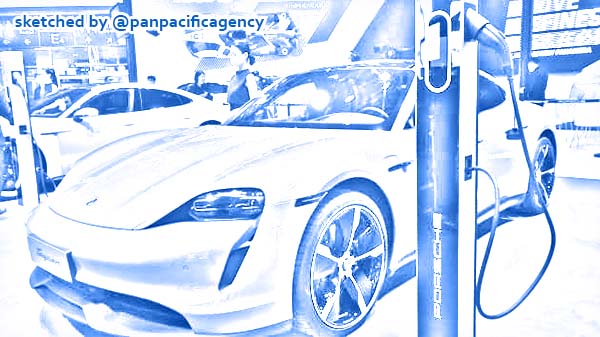Stellantis to rapidly grow exports of Chinese EVs to Europe, other countries

Porsche is working with third-party operators for more than 200,000 charging points in China. Evelyn Cheng | CNBC. Sketched by the Pan Pacific Agency.
HANGZHOU, May 14, 2024, CNBC. Automaker Stellantis expects to quickly grow sales of China-made electric vehicles outside of the country through a new joint venture with Leapmotor, starting later this year, according to the two companies, CNBC reported.
The companies said Tuesday that beginning in September, sales of the China-built Leapmotor vehicles will begin through Stellantis’ distribution networks, including dealers in Europe — France, Italy, Germany, Netherlands, Spain, Portugal, Belgium, Greece and Romania.
Those markets will be followed by the Middle East and Africa, India and Asia Pacific, and South America in late 2024, the companies said.
The expansion plans do not currently include distribution in the U.S., Stellantis CEO Carlos Tavares said Tuesday following a press conference in Hangzhou, China, where Leapmotor is based. That’s due, in part, to new American tariffs on China-made EVs, Tavares said, citing among other reasons as well.
The Biden administration on Tuesday announced stiff new tariff rates on billions’ worth of Chinese imports, including quadrupling tariffs on imported Chinese electric vehicles, from 25% to 100%.
“There is very limited Chinese offering in the U.S. market, so it is not a priority for us,” Tavares said. “There is a lot in Europe because we see Europe has a very different approach for this problem. … It looks like the U.S. is going for a very strong protectionism. Whereas, for the time being, I see Europe is keeping the market reasonably open.”
The joint venture’s expansion plans include at least six EVs by 2027, according to a presentation by Stellantis and Leapmotor. The cars, initially budget vehicles, are expected to be complementary to Stellantis’ current vehicle lineup, the companies said.
The announcement comes amid increasing geopolitical tensions surrounding China-made electric vehicles in the U.S., Europe and other regions. Many in and around the automotive industry fear the less-expensive, China-made vehicles will flood the markets, undercutting domestic-produced EVs.
Biden administration to increase tariffs on $18 billion of imports from ChinaWATCH NOW
VIDEO01:02
Biden administration to increase tariffs on $18 billion of imports from China
“From a Stellantis perspective, our position is we compete. We compete with the Chinese carmakers and we compete as strongly as we can because it’s the best way to learn. It’s the best way to stay fit for the global race in which we are now part of,” Tavares said.
Tavares said Tuesday that the Chinese carmakers, which he previously called Stellantis’ greatest competitors, are expected to rapidly grow internationally — with or without joint venture assistance.
“Whether I like it or not, with me or without me, Leapmotor would have been in Europe anyway … perhaps not as fast, perhaps not as strongly but they would have gone to Europe,” Tavares said. “What I am doing is just trying to be opportunistic against a dynamic that has been created by the Chinese carmakers.”
Chinese companies accounted for 8% of Europe’s all-electric vehicle sales as of September and could increase their share to 15% by 2025, the European Union said in October 2023. The EU believes Chinese EVs are undercutting the prices of local models by about 20% in the European market.
The influx of Chinese EVs has spurred the European Union to launch government support for the industry.
“The partnership between Leapmotor and Stellantis demonstrates a high level of efficiency, opening a new chapter in the global integration of China’s intelligent electric vehicle industry,” Leapmotor founder, chairman and CEO Jiangming Zhu said in a release. “We believe that this cooperation can give Leapmotor a boost to become a respected world-class intelligent electric vehicle company.”
The companies declined to disclose sales volume expectations for Leapmotor vehicles sold through Stellantis’ sales network, which is expected to grow from 200 locations to up to 500 by 2026. Leapmotor reported deliveries of 144,155 vehicles in 2023, a roughly 30% increase from the previous year.
Stellantis owns 51% of the joint venture with Leapmotor, announced earlier this year and including an investment of 1.5 billion euros in Leapmotor for a roughly 21% stake in the company.
As part of the deal, Stellantis has exclusive rights for export and sale, as well as for manufacturing Leapmotor products outside of Greater China.